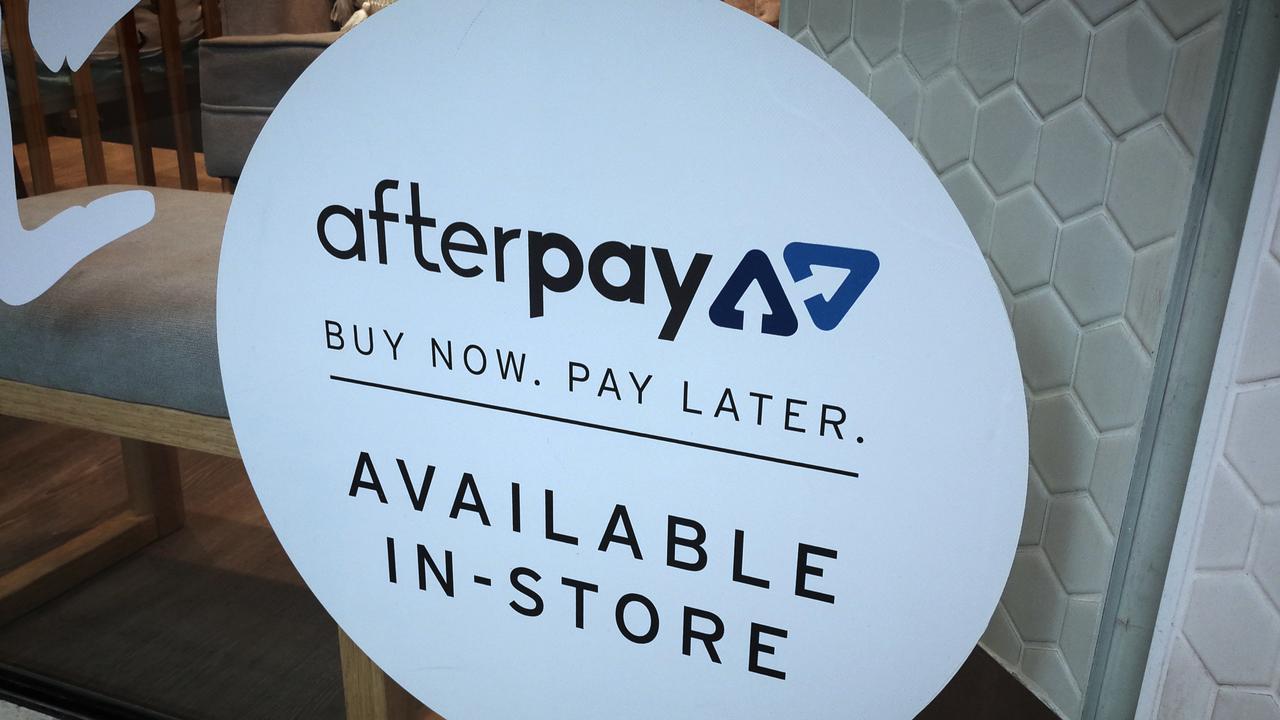Forget consumer credit rules, BNPL’s real fight yet to come
Buy now, pay later has been told to grow up, although a dramatic change in fortunes means the once-thriving sector now faces a much bigger test.

Business
Don't miss out on the headlines from Business. Followed categories will be added to My News.
Buy now, pay later has been given the regulatory equivalent of being told to grow up although a dramatic change in fortunes means the once-thriving payments sector faces a much bigger test.
Assistant Treasurer Stephen Jones is talking tough over a crackdown. However he has taken the more gentle approach to regulating BNPL in bringing it under the Credit Act, giving the sector some crucial carve-outs. Essentially, it will be business as usual for the bigger players.

The rules will see BNPL avoid the heavy obligations that banks and credit card providers face under the Credit Act, including the legally fraught “unsuitability” test under responsible lending rules.
While finer details of Jones’ proposal are yet to be finalised, the new rules are also likely to see BNPL avoid credit reference checking. This has been the feature of the business to offer on the spot financing that has helped it quickly grow online. Despite the immediate share hits, players like Zip and Humm were rushing to welcome the modest proposals.
For the players, the changes outlined on Monday by Jones will mean a more formal internal and external dispute resolution processes, hardship provisions, compensation, fee caps and rules around marketing. The decision was based on one of three Treasury recommendations from last November: self regulation; limited Credit Act; or the full Credit Act.
Jones for his part called out what BNPL is – a form of credit, but didn’t want shut off the competitive bent the sector has offered.
Jones describes the BNPL proposals as “the right fit for the risk level of their products”.
The changes will represent a headache, a minor one for the bigger players – but won’t put a break on growth of the sector.
The real risk remains with the Reserve Bank of Australia, which had given BNPL a free pass around surcharging rules. For several years as BNPL started to become more active the central bank declared the sector exempt from surcharging – that is, allowing retailers to pass on the cost of the transaction to consumers.

However the RBA changed its position in October 2021 saying it was time for BNPL to remove the no-surcharging position, although this was a voluntary recommendation. Unlike credit and debit cards, the RBA doesn’t have the legislative instrument to force BNPL to drop their no-surcharging position. Treasury is now looking updating the RBA’s regulatory powers over new and emerging technology.
While ‘no surcharging is in place, it gives BNPL the ability to undercut other payment schemes like credit cards or direct debit. And this has allowed BNPL to be a more attractive option for consumers when it comes to financing smaller transactions in particular. It can be switched off at any time.
For several years the RBA-backed Payments System Board made an assessment that BNPL providers in Australia have not yet reached that point where there would be a public interest in removing the no-surcharge rule.
The central bank had initially wanted the BNPL to grow given the sector has injected new competition and some innovation in the payments system.
The move to be regulated under the Credit Act changes come as the once-booming sector is already facing a major structural test.
There has been a shake-out with cheap financing shut off as interest rates have been rapidly raised around the world. With BNPL shares collapsing from their boom-time levels, main players are being forced to reinvent themselves as non-bank lenders and raise debt financing in the securitisation market or bank warehouse funding where they are paying top dollar.
All BNPL players have swung the axe on jobs, with the preservation of cash the main game. A shake-out in the sector is already underway – Openpay called in the administrators earlier this year, and many from Klarna to Zip have since scaled back global growth ambitions.
BNPL challenged
All this comes amid a slowing economy and the prospect of rising unemployment. Indeed, with the sector appealing to younger consumers, this makes BNPL even more exposed to lending losses.
Zip Co, remains the biggest pure play operating in the sector following last year’s mega-merger between Afterpay and Jack Dorsey’s Block. At its peak, Zip shares were pushed up above $12 each and were valued at more than $5bn. On Monday, the company is trading at 55c each, meaning it’s worth a little over $400m.
Zip co-founder Peter Gray earlier on Monday said there will be limited impact from the new rules telling ABC Radio they provide “a sensible balance between consumer protection and minimum standards, but also promoting and supporting competition and innovation.” Humm (the former FlexiGroup) says the planned changes represent a “balanced and proportional” response.
On the whole, consumers have arguably benefited from BNPL. Indeed, the instalment-style financing has turned bank consumer credit businesses on their head and has seen a younger generation increasingly turn their backs on credit cards. At the same time, retailers of all sizes have benefited, helping them to speed up sales, particularly for online transactions.
With the lofty growth years behind them, a change in credit rules is the least of BNPL’s worries.
Wary of private equity
Life has been coming pretty fast at payments platform Tyro.
In the two-and-half years since Tyro listed on the ASX, it has had two CEOs and two chairs. It has seen board and executive turnover and has so far fielded two takeover approaches. One was a banking major – Westpac, which was clearly just kicking the tyres – and the more serious approach came from Potentia Capital, the private equity fund backed by MYOB founder Tim Reed and former Archer Capital boss Andrew Gray. After nine months of talks and intense negotiation, Potentia’s offer has amounted to nothing.
The lesson from this is a case of always check the colour of the bidder’s cash.

Potentia is the one carrying the reputational damage here given this is the second time there’s been a last-minute breakdown well into the takeover process. In late 2021 Potentia and partner TPG walked away from a $1.4bn bid for Michael Carapiet’s listed Smartgroup after a period of extensive due diligence. Then last year Potentia was involved in a messy $430m takeover for ASX-listed Nitro Software, notable for frustrating shareholders in a low energy bidding battle against KKR-backed Alludo. Any future target is going to think twice before seriously engaging.
There are questions over whether Potentia really knew what it was buying in Tyro and whether it had sold the initial story to its own financial backers. It was only late last week that one of Potentia’s consortium members walked when it looked like patient capital was really needed to deliver in a $860m-plus takeover of Tyro.

A key part of this plan was to unwind Tyro’s banking licence, which would have released capital, but that was a regulatory process that was clearly always going to take time.
Even so the collapse in takeover talks between Tyro and Potentia shouldn’t come as any surprise given the reporting of my colleague Bridget Carter showed momentum had clearly stalled following a round of due diligence. This was adding to frustration of Tyro’s big shareholders including tech billionaire Mike Cannon-Brookes, who were looking for a deal.
However investors were still caught short on the breakdown, sending Tyro shares down 16.6 per cent to $1.28. Ironically this is right near the $1.27 a share level where Potentia made its initial approach last September.
After some negotiation Potentia upped its bid through summer to $1.60 a share but Tyro’s board held firm in seeking a better offer. Tyro showed it was in the game by agreeing to open the door to a period of due diligence. It took time but by last week the two sides became incredibly close to reaching an indicative transaction agreement with all that needed to be signed were terms and conditions. One of Potentia’s bidding consortium members had a different view. Now this is all history.
With the Potentia sideshow over, Tyro has plenty of work ahead to win the confidence of its shareholders with a new strategy and new chief Jon Davey. After jumping from one battle to the next, what the payments company really needs is a clear runway and consistent operating performance.
More Coverage
Originally published as Forget consumer credit rules, BNPL’s real fight yet to come









